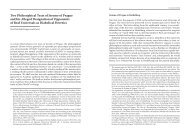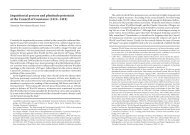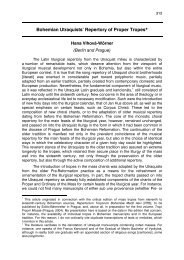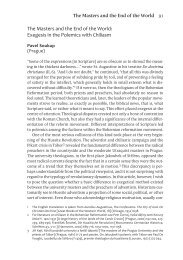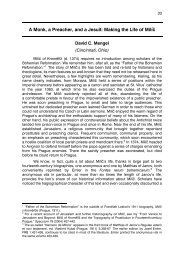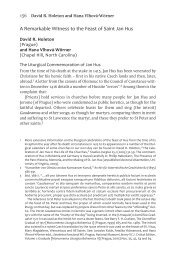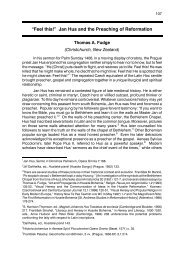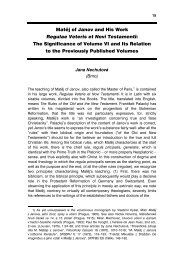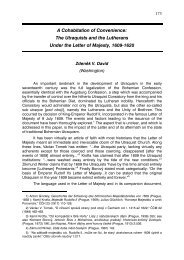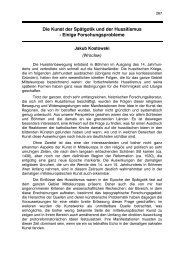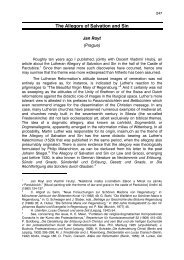quod mulieres, que sunt in Christo, in hoc - Bohemian Reformation ...
quod mulieres, que sunt in Christo, in hoc - Bohemian Reformation ...
quod mulieres, que sunt in Christo, in hoc - Bohemian Reformation ...
Create successful ePaper yourself
Turn your PDF publications into a flip-book with our unique Google optimized e-Paper software.
90<br />
a late spouse, for whom he cont<strong>in</strong>ued to grieve and whom he respected as his<br />
children’s mother. 53 Yet, despite his high valuation of the spousal relationship, 54<br />
which imposed duties on husbands toward their wives, 55 Štítný still postulated the<br />
requirement of wives’ obedience and subord<strong>in</strong>ation to their husbands. He followed<br />
St. Paul’s <strong>in</strong>junction “Wives be subord<strong>in</strong>ate to your husbands.” 56 In order to illustrate<br />
the marital relationship, the rustic theologian availed himself of a simile put forth by<br />
the earlier mentioned Hildegard von B<strong>in</strong>gen, who compared a housewife to the<br />
moon. As the latter derived its beauty from the sun, the former owed her honour to<br />
the husband. 57 The householder had to rear his wife as well as the household staff,<br />
and Štítný accord<strong>in</strong>gly taught that it was the responsibility of the head of the<br />
household to prevent “his wife and the rest of the household” from fall<strong>in</strong>g <strong>in</strong>to vice<br />
and evil. First of all, he was to do so by example, k<strong>in</strong>dness, and admonition, but “if<br />
goodness failed to affect them, he had the right to unleash his power of dom<strong>in</strong>ion.” 58<br />
Evidently, the householder was thus authorized to employ harsher means not only<br />
toward the servants, but also toward his wife. She, <strong>in</strong> her turn, was unable to<br />
reciprocate <strong>in</strong> k<strong>in</strong>d, as Štítný considered self-evident, and counseled the wife that she<br />
had no other choice but turn<strong>in</strong>g to God <strong>in</strong> order to alleviate any hardships, which her<br />
spouse might have <strong>in</strong>flicted on her. 59<br />
Respect<strong>in</strong>g the memory of his late wife and his children’s mother, and<br />
affected by the atmosphere of a pronounced Marian cult, Štítný like his predecessors<br />
expressed with a genu<strong>in</strong>e feel<strong>in</strong>g the panegyric to Mary’s motherhood and virg<strong>in</strong>al<br />
purity <strong>in</strong> his “Explication of Hail Mary” [Výklad na ‘Zdrávas Maria]. 60 Follow<strong>in</strong>g a<br />
number ecclesiastical authorities, and perhaps particularly affected by Matěj of<br />
Janov, he did not forget to emphasize Mary’s special favour to womanhood when:<br />
“…through her the curse of Eve had been lifted from her entire race which had<br />
become eligible for eternal life thanks to the blessed fruit of her womb…” 61<br />
II. Hus, Jakoubek, and Želivský<br />
Although Jan Hus also discharged many critical salvos <strong>in</strong>to the female ranks, it<br />
is important to note that – like Janov – he avoided generaliz<strong>in</strong>g such vituperations.<br />
He dist<strong>in</strong>guished virtuous and vicious women apply<strong>in</strong>g the yardstick of s<strong>in</strong>fulness<br />
because for him s<strong>in</strong>, not gender, was the criterion. 62 The virtuous group represented<br />
for him true Christians whom he viewed with k<strong>in</strong>dness and affection. These moral,<br />
pious, and genu<strong>in</strong>ely religious women had already undergone an <strong>in</strong>ternal renewal<br />
under the <strong>in</strong>fluence of his precursors. Such paragons not only formed the core of the<br />
53<br />
Rychterová, “Žena a manželství,” 103-107.<br />
54<br />
Ibid. 106-107.<br />
55<br />
Gebauer, “O životě a spisích,” 44 ff.<br />
56<br />
Tomáš ze Štítného, Knížky šestery 105: “…likewise a humble and wise housewife…from true love<br />
will obey her husband, listen<strong>in</strong>g to the words of St. Paul, who says: ‘Wives be subject to your<br />
husbands’ …”<br />
57<br />
Ibid. 100: “A wise and noble housewife is compared to the moon. As the moon takes all its beauty<br />
from the sun, so also she has her honor from her husband…” It is a mere variant of Heldegard’s<br />
dictum that a woman receives her strength from her husband, as the moon does from the sun; see<br />
D’Alverny, “Comment les théologiens,” 123.<br />
58<br />
Tomáš ze Štítného, Knížky šestery 98.<br />
59<br />
Ibid. 106.<br />
60<br />
Ibid. 287-298.<br />
61<br />
Ibid. 288.<br />
62<br />
Jan Hus, Výklady Opera omnia I:320.



